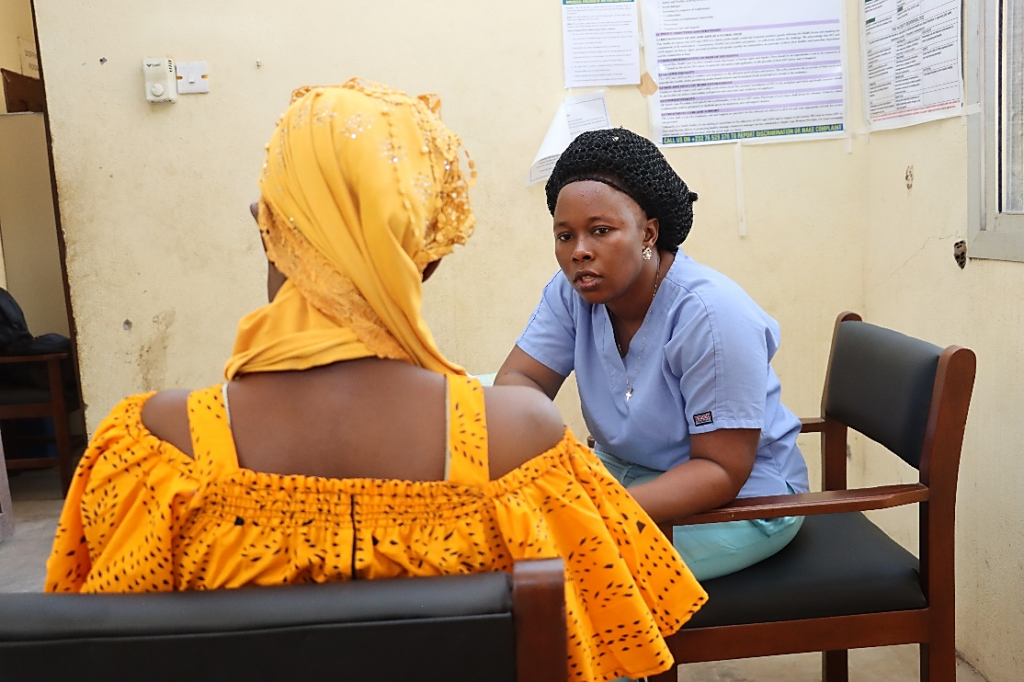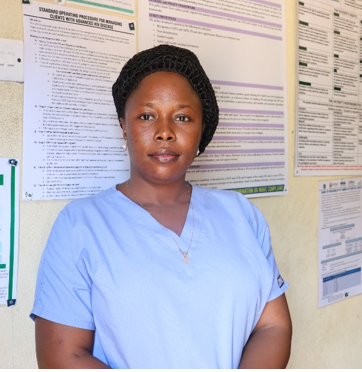One year ago, in a small town in northwest Sierra Leone, Catherine Kamara, a 24-year-old pregnant woman, tested positive for HIV during her antenatal care appointment.
“The news of my health condition was overwhelming and scary,” says Catherine. “With counseling and encouragement from Nurse Tinny, I discussed it with my husband and asked him to get tested. My husband’s test was positive while my firstborn tested negative. This news brought so many unsaid words between us for a very long time. Ultimately, we accepted our status and began medication.”
Catherine learned how to manage her HIV status thanks to Nurse Tinny Bangura and other health workers who were trained by Global Reach II, a Jhpiego-led project working in partnership with the government of Sierra Leone to provide comprehensive high-quality HIV services, including HIV prevention, care and treatment, at 30 facilities and eight drop-in centers across four districts.

Sierra Leone has a high vertical transmission rate for HIV (15.79%). In addition, access to HIV testing and treatment is limited and viral suppression among children is low. The country is lagging behind its UNAIDS 95-95-95 goals for children—25% of children living with HIV have been diagnosed, 25% are receiving antiretroviral therapy (ART), and 18% have reached viral load suppression. Among the eight countries in the West Africa Regional Program of the U.S. President’s Emergency Plan for AIDS Relief (PEPFAR), Sierra Leone has the lowest HIV treatment coverage for children.
Funded by PEPFAR and administered by the Health Resources and Services Administration, Global Reach II is a five-year project operating in Sierra Leone, Zambia, Uganda and Ethiopia that helps address challenges in country-level HIV responses. In Sierra Leone, the project strengthens health care providers’ skills to ensure HIV services are accessible, high quality and integrated in all areas, including antenatal care.
For Catherine, the young mother in Sierra Leone, support from Nurse Tinny, who specializes in maternal and child health, was essential to managing her HIV and making sure she didn’t transmit it to her son. Maternal and child health aides work closely with each pregnant woman or mother who comes to the facility to understand their unique challenges in adhering to treatment, such as side effects or difficulty with medication schedules. Nurse Tinny talked to Catherine about the importance of regularly taking her medication, eating a balanced diet and attending antenatal clinics.
“I needed to deliver a healthy baby and there was no other way of doing that than taking my medicine and following the recommended guidelines for HIV-positive pregnant women,” Catherine says.
Catherine gave birth to a healthy baby boy, overcame her hesitation in taking medication while breastfeeding, and consistently adhered to the ART regimen. Today, Catherine’s son remains HIV free and she is among the 10,000 women living with HIV who have been served through Global Reach II.

“When I started working with the HIV unit in my facility, I was shocked by the high number of patients not adhering to their antiretroviral therapy regimens, which are essential for keeping the virus under control and preventing the development of AIDS,” says Nurse Tinny. “After I received training from Global Reach II on care and treatment guidelines, I assembled the health team to develop comprehensive care plans that addressed each client’s physical, emotional and social needs.”
Over time and with help from Nurse Tinny, the facility counselor and an expert client (a client living with HIV who shares their experience and helps others understand their HIV-positive diagnosis and treatment), Catherine found that the more she learned and spoke openly about living positively with HIV, the more supportive and accepting others were of her status. As a result, she created a unique bond that brought her and her baby closer together than she could have imagined possible while having HIV.
“I can’t change the past, but I can improve my future by living healthily and supporting my children in the best way possible—just like others living with HIV are doing,” says Catherine.
For Nurse Tinny and other Global Reach II-trained health care providers, the goal is to support clients to achieve a level of HIV at which the virus is undetectable and therefore, no longer transmissible. “Achieving undetectable viral load levels is a journey, and we are on that road,” says Nurse Tinny. “HIV is not the end. Early detection saves lives and reduces the stress burden on clients.”
Alice Christensen, a registered nurse and Global Reach II Project Director, provided a technical review of this story.
Bilkisu Jah is the Knowledge Management Technical Advisor for Jhpiego Sierra Leone. Dr. Basil Uguge, HIV and Infectious Disease Technical Lead on the Global Reach II project, and Joan Nduta, Sr. Communications Manager, Africa Region, contributed to this story.



